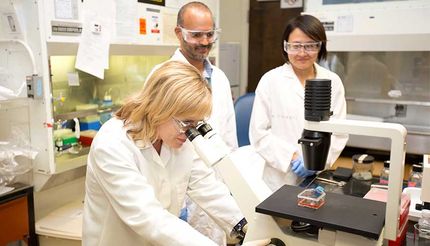Researchers create infectious hepatitis C virus in a test tube
Method enables scientists to study all stages of virus' life cycle
A team of researchers led by scientists at The Rockefeller University has produced for the first time an infectious form of the hepatitis C virus (HCV) in laboratory cultures of human cells. The finding, reported in the June 9 issue of Science Express, will allow scientists to study every stage of the HCV life cycle and develop drugs to treat this life-threatening disease that affects more than 170 million people around the world.
Like all viruses, HCV cannot replicate by itself; instead it takes over the machinery of a host cell to make copies of itself. Much about the life cycle of HCV remains poorly understood because scientists have been unable to reproduce an infectious form of HCV that they can observe in cell cultures. The method developed by Rice and his colleagues, including scientists at the Massachusetts Institute of Technology and the Scripps Research Institute, changes that.
Although little is know about the HCV life cycle, researchers think that in humans the virus enters a liver cell and delivers its RNA and proteins into the cell cytoplasm. HCV carries its genetic information in its RNA, which is separated from the protein, copied, and then joined with new protein components before being released from the liver cell to infect other cells.
Brett Lindenbach, Ph.D., Charles M. Rice, Ph.D. and their colleagues named their infectious cell culture virus HCVcc. Already HCVcc is yielding new knowledge about HCV. In a separate set of experiments, the researchers used HCVcc to confirm that a molecule called CD81, which sits on the surface of the human cell membrane, plays a crucial role in the entry of HCV. Scientists have known that a protein produced by HCV, called E2, binds to CD81, and they believed that this interaction is necessary for the virus to bind to target cells.
The Rockefeller researchers showed that CD81 molecules that are not attached to the surface of host cells compete with membrane-bound CD81 and inhibit entry of HCV into the cell. They also showed that HepG2 cells, which do not express CD81 but can support HCV RNA replication, could not be infected by HCVcc unless they express CD81.
Organizations
Other news from the department science

Get the life science industry in your inbox
By submitting this form you agree that LUMITOS AG will send you the newsletter(s) selected above by email. Your data will not be passed on to third parties. Your data will be stored and processed in accordance with our data protection regulations. LUMITOS may contact you by email for the purpose of advertising or market and opinion surveys. You can revoke your consent at any time without giving reasons to LUMITOS AG, Ernst-Augustin-Str. 2, 12489 Berlin, Germany or by e-mail at revoke@lumitos.com with effect for the future. In addition, each email contains a link to unsubscribe from the corresponding newsletter.





















































